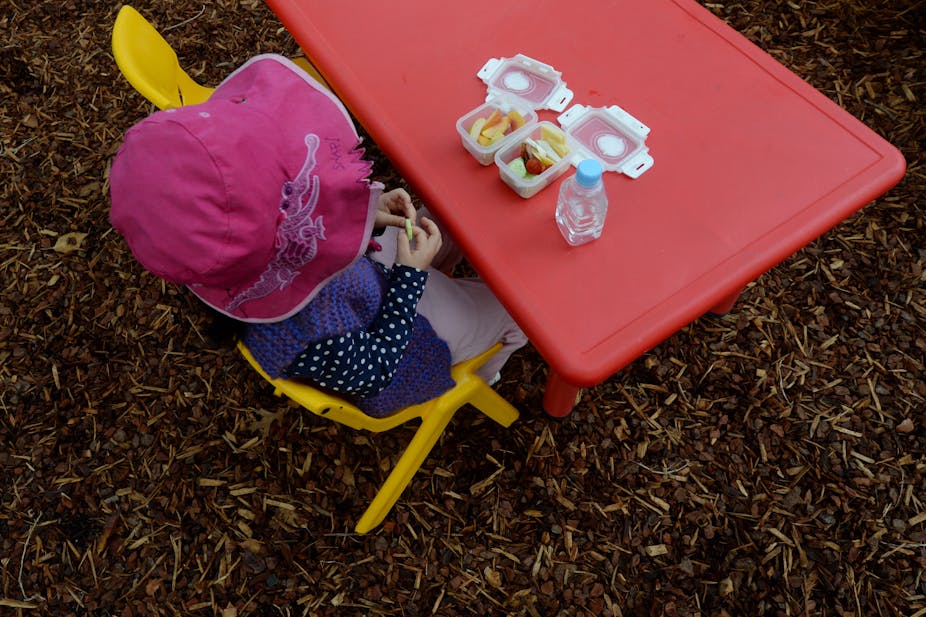The long-awaited report to government by the Productivity Commission on Childcare and Early Childhood Learning is a disappointment for the sector. The report ignored what leading experts in education and early childhood from around the world believe – that the quality of early childhood services is vital.
The first five years is when 80% of a child’s brain development occurs. This sets the foundation for development and learning in later years. Quality early childcare sets up a child for school and the learning habits they develop in these critical years can last a lifetime.
Australian early childhood education and care lags behind its OECD partners due to low financial investment in the sector. The OECD recommends countries spend a minimum of 1% of GDP on early learning. The OECD average is 0.7% and Australia spends 0.45%.
The report did not recommend an increase in funding. Instead, it recommended the current complicated system of payments, such as the childcare rebate, childcare benefit and jobs education and training childcare fee assistance, be replaced by a single means-tested subsidy called the early care and learning subsidy. This would be paid directly to service providers.
The report takes a short-term, quick-fix approach. If implemented by the government, it will not improve Australia’s dismal rating in terms of the OECD assessment of quality in early childhood education and care.
This report is a missed opportunity to build on the investment in quality made by the former Labor government, which instigated a new quality authority. ACECQA has begun to oversee the roll-out of a National Quality Standard.
A regulatory authority is now visiting services, rating and assessing how they implement the National Quality Standard. The qualifications required of those working in the sector have been increased. This is all working towards improving Australia’s poor childcare standing in the OECD.
The quality gains made in the last three years should now be built on. The report does not address the issue of funding to bring pay rates for professionals working in the sector in line with the teaching profession. Both teaching and early childhood education are regarded as worthy careers. However, they are worlds apart in terms of training, status and compensation.
School teachers are employed in what is a traditional, relatively uniform and coherent system of services with well-established federal funding and public support. The early childhood education workforce, by contrast, operates within an unwieldy, cumbersome mix of services, spread across the for-profit and not-for-profit sectors.
The report does not get to the heart of the matter, which is to provide early childhood services with federal funding to recruit and retain qualified early childhood educators. The report also recommended winding back some of the qualification requirements for childcare centre staff, introduced under the previous government, which would help centres cut costs.
Investment in the early childhood sector would have a lasting impact on the contribution that early learning makes in shaping future national productivity and prosperity. We know that people who participate in enriched early childhood programs are more likely to complete school and much less likely to require welfare benefits, become teen parents or participate in criminal activities.
Longitudinal research carried out between 1962 and 1967, on children aged three and four, randomly divided children into groups who received high-quality preschooling and a comparison group who received no preschooling. In the study’s most recent phase, 97% of the study participants still living were interviewed at age 40. Additional data were gathered from the subjects’ school, social services and arrest records.
The study found that adults at age 40 who had the preschool program had higher earnings, were more likely to hold a job, had committed fewer crimes and were more likely to have graduated from high school than adults who did not have the benefits of preschool as children.
This research was built on by Nobel Prize-winning University of Chicago Economics Professor James Heckman. His now-famous Heckman equation shows the great gains to be had by investing in early learning. He shows early childhood education is more efficient than many other interventions later in life. For disadvantaged students, interventions in early childhood had much higher economic returns than interventions during primary school, in high school or in early adulthood through job training.


